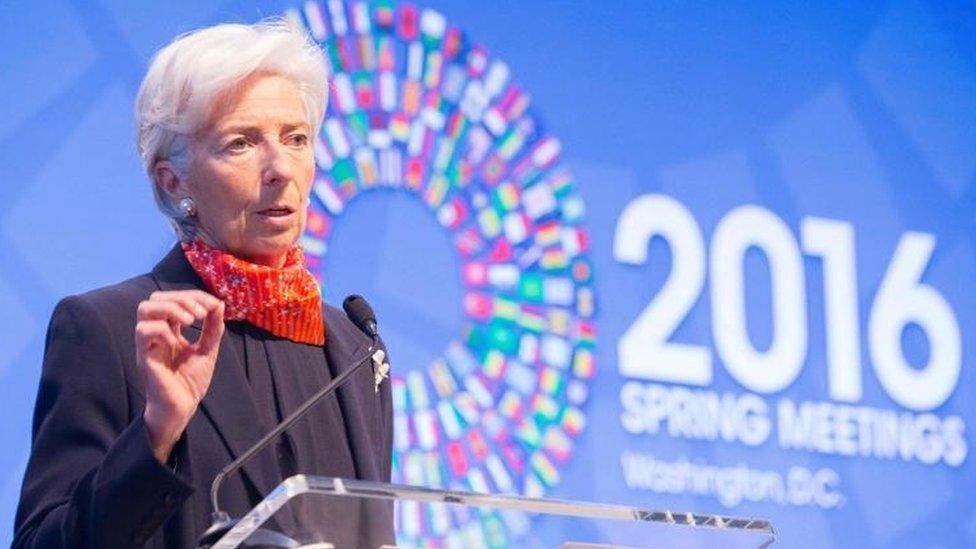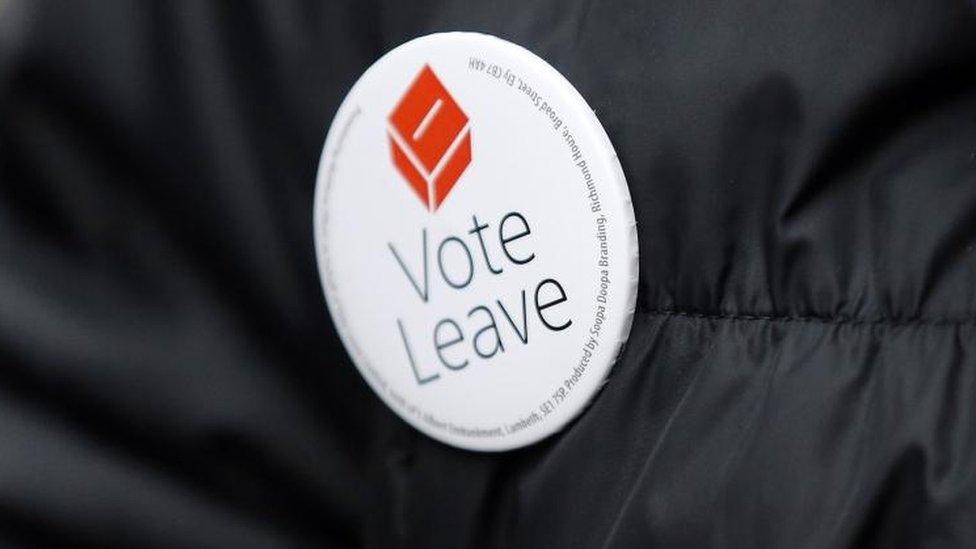On Brexit, IMF is speaking Osborne’s language
- Published
- comments

The IMF's Spring Meeting is expected to see further warnings on Brexit risk from Christine Lagarde
In economics - once called the "dismal science" - there are very few definites.
Predictions are couched in conditionals - could, might. Facts in a world driven by unpredictable human behaviour are hard to nail down.
Particularly when many of those humans, in the case of the European Union referendum, are politicians with all sorts of competing interests to juggle.
But the strength of the warnings in this case is nevertheless clear.
Maurice Obstfeld, economic counsellor to the International Monetary Fund and the organisation's chief economist, says there could be "severe regional and global damage" if Britain were to vote to leave the European Union.
An exit would present "major challenges" and a prolonged period of uncertainty which would "weigh" - that is have a negative effect - on confidence and investment.
Market volatility could increase, trade could be damaged and economic growth undermined.
Mr Obstfeld, an expert in international finance, is a former economic adviser to President Barack Obama.
And, as one of the top 40 economists cited in the world for his research, has muscle in this arena.
His is the second of a series of "pro-Remain moments" mapped into the government's campaign grid.
The first, launched yesterday, was the government's pamphlet arguing that remaining in the EU was the "best decision" for the UK.
That has had its fair share of critics.
Later this week, the IMF's Spring Meeting in Washington is expected to see further warnings on Brexit risk from Christine Lagarde, the organisation's managing director.
George Osborne is flying to America tonight as the government's representative.
That event will be followed by the Presidential visit later this month when President Obama is expected to warn Britain about the dangers of leaving the EU.
The Treasury certainly believes this is a vital few weeks in making the case for remain.
As important, those close to the chancellor believe, as the moment Mark Carney, the governor of the Bank of England, said Brexit could be the most significant domestic risk to the UK economy.
Mr Carney couched those March words carefully, not wanting to compromise his political neutrality in a debate that is, of course, highly political.
And he was careful to say that there were also risks to remaining in the EU, not least the "unfinished business" of monetary union.
He also pointed out that over the longer term there can be no "conclusive answer" to the question whether it would be good or bad for the economy if the UK left the EU.

The Leave campaign argues that the "establishment" economists are wrong
The Treasury see the likes of Mr Carney and Mr Obstfeld as key to making the case for Britain to remain in EU.
The fact they are not politicians - in an era of diminished trust - is seen to help.
They are certainly important voices.
But they are not the only ones.
Capital Economics, for example, has produced a weighty report saying there could be clear economic "opportunities, created by leaving the EU, to boost trade with other countries".
There may be uncertainty for a period, but, released from the shackles of having to negotiate with the other members of the EU on market reform, the UK's economy could ultimately grow more quickly.
Those that support the leave campaign also point out that many economists backed Britain joining the single currency.
As one senior figure of the Leave campaign said to me yesterday, the "establishment" economists were wrong then and the "establishment" economists are wrong now.
Elites, he argued, always favour cosy consensus.
The IMF's words today on Brexit are judgements, without much corresponding data.
That data may come in the IMF's UK-focused report due in May, which is likely to flesh out Mr Obstfeld's gloomy predictions.
Rest assured, Mr Osborne will be hoping the public will engage again at that "moment" in the EU referendum debate.